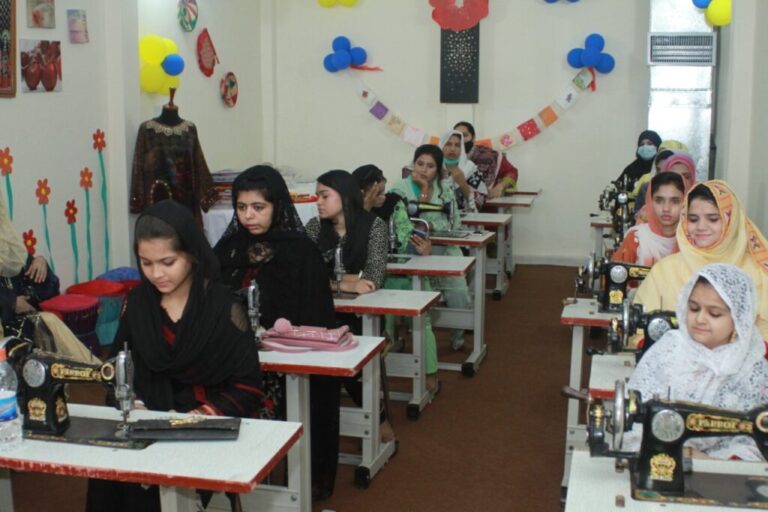In recent years, Pakistan has witnessed a transformative shift in the landscape of women’s empowerment, largely driven by skill development programs. These initiatives are not just providing women with the tools to enhance their employability; they are reshaping societal norms, fostering economic independence, and building a future where women can thrive both personally and professionally.
The Need for Skill Development
Pakistan has a rich cultural heritage, but it also faces significant challenges, particularly concerning gender equality. Women in many parts of the country have traditionally been confined to domestic roles, with limited access to education and professional opportunities. According to various reports, a large percentage of women remain unemployed or underemployed, primarily due to a lack of skills and vocational training.
Recognizing this gap, various organizations—both governmental and non-governmental—have initiated skill development programs aimed at empowering women. These programs target a variety of skills, from traditional crafts to modern technology, catering to the diverse needs of women across urban and rural areas.
Types of Skill Development Programs
- Vocational Training Centers: Many NGOs and government institutions have set up vocational training centers that offer courses in sewing, embroidery, and handicrafts. These skills not only enable women to earn a livelihood but also preserve cultural crafts that might otherwise fade away.
- Digital Skills Training: As the world becomes increasingly digitized, digital literacy has become crucial. Programs focused on teaching women basic computer skills, social media marketing, and e-commerce have opened up new avenues for employment and entrepreneurship.
- Entrepreneurship Development Programs: These initiatives provide women with the knowledge and resources needed to start their own businesses. From financial literacy to marketing strategies, these programs equip women with the skills to become successful entrepreneurs.
- Health and Wellness Training: In addition to economic skills, programs that focus on health, nutrition, and wellness empower women to take charge of their health and that of their families, creating a healthier society overall.
Impact on Lives and Communities
The impact of these skill development programs is profound and multi-dimensional. Here are some key ways in which they are changing lives:
- Economic Independence: By acquiring new skills, women are able to contribute to their household income, leading to greater financial independence. This economic empowerment enables them to make decisions that affect their lives, from healthcare to education for their children.
- Social Empowerment: As women gain skills and confidence, they often become role models in their communities. Their success can inspire other women to pursue their own educational and professional goals, creating a ripple effect of empowerment.
- Reduction of Gender-Based Violence: Economic independence has been linked to a decrease in domestic violence. Women who are financially stable are more likely to leave abusive relationships, thereby promoting a safer environment for themselves and their children.
- Improved Education for Future Generations: Empowered women are more likely to prioritize education for their children. By investing in their children’s future, they break the cycle of poverty and contribute to the overall development of society.
Success Stories
Numerous success stories illustrate the transformative power of skill development programs. For instance, a group of women from a rural village in Sindh, after completing a vocational training course in sewing and tailoring, started a small business that not only provides income for their families but has also created job opportunities for other women in the community.
Similarly, women trained in digital skills have leveraged e-commerce platforms to sell handmade products, reaching customers beyond their local markets. These stories reflect the potential of skill development to uplift entire communities, driving social and economic change.
Challenges Ahead
Despite the progress made, several challenges remain. Cultural barriers, limited access to training facilities, and inadequate funding for programs can hinder the effectiveness of skill development initiatives. It is essential for stakeholders, including the government, NGOs, and private sector, to collaborate and address these challenges effectively.
Conclusion – Empowering Women
Empowering Women is crucial for achieving social, economic, and political progress in Pakistan. Focusing on empowering women ensures equal opportunities in education, employment, and leadership, enabling them to contribute effectively to society. By empowering women, communities witness increased innovation, productivity, and social cohesion, as women play a vital role in shaping families, businesses, and institutions.
Policies and initiatives aimed at empowering women create pathways for skill development, financial independence, and decision-making power, fostering a culture of equality and respect. Promoting empowering women aligns with the vision of a Mazboot Pakistan, where gender equality strengthens national development and social resilience. By supporting programs for empowering women, Pakistan can harness the full potential of its population, ensuring sustainable growth and a brighter future.
In conclusion, empowering women is not just a social goal—it is a strategic priority for building a progressive, inclusive, and prosperous nation. By investing in empowering women, Pakistan moves closer to creating a Mazboot Pakistan, where women’s contributions are recognized, valued, and leveraged for national growth, innovation, and equality.

